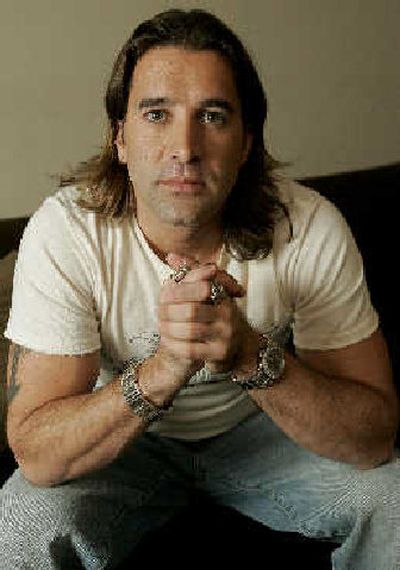Back from exile

Scott Stapp, the former lead singer of Creed, is back from career exile with an album titled “The Great Divide.”
It’s a fitting name – there may be no more polarizing figure in recent rock history, and the gulf between his fans and his detractors is wide and ugly.
Stapp may have been the most mocked man in rock in the 1990s, but Creed also sold a staggering 25 million albums in the United States alone.
The problem now is that while pop audiences’ infatuations fade fast, rock purists know how to hold a grudge.
None of this is lost on Stapp.
“I don’t know what to expect, I really don’t,” he said in a hushed voice during a recent visit to Los Angeles to promote the new CD.
“Do I pick up where I left off? Or do I have to start all over again, playing to five people in a room? Do I have to work my way back up?”
Stapp, 32, reached great commercial heights with Creed, a band that presented a radio-friendly sound that was part simplified Pearl Jam and part arena-rock spiritual anthem.
His childhood as the disaffected son of a Pentecostal minister in Florida may have left him privately conflicted, but on stage he was an evangelist in leather pants belting out hits such as “My Sacrifice,” “Higher” and “My Own Prison.”
As the band propelled itself to the very top of rock, Stapp became something akin to the Vanilla Ice of modern rock – ridiculed as derivative, vainglorious and undeserving.
And though Bono has long laced rock with Christian imagery, Stapp’s messianic music videos made him a laughingstock with music critics and even some peers. Dexter Holland of the Offspring, for instance, used to wear an “Even Jesus Hates Creed” T-shirt on stage.
In the end, Creed didn’t even like Creed. The band officially broke up last year, but the first death rattle was in December 2002 on stage in Rosemont, Ill.
Stapp’s account of the night is that increasing tension within the band inspired him to turn and call out his mates while performing the aptly titled “Who’s Got My Back.”
Seeing something in their eyes that was less than supportive, Stapp says, he plopped down on stage on his back and sang to the rafters. Some fans at the show had a different interpretation; they filed a lawsuit claiming that Stapp was drunk or loaded and that the band owed a refund to all 15,000 fans on hand.
Months after the Rosemont fiasco, Stapp and guitarist Mark Tremonti, the musical forces behind Creed, came together in the studio to begin work on the band’s fourth studio album. It went nowhere.
After that, Stapp, for the first time, found himself running away from the spotlight.
“It was killing me, so I ran off to Maui and spent a lot of time with my son,” he said. “I was internalizing everything. You can’t have a me-against-the-world attitude, and I know that now. This is a business where you have to let a lot of stuff go.”
For a guy steeped in Christian experience, Stapp sounds pretty Zen these days. He won’t talk about Tremonti and company (who formed a new band, Alter Bridge, with former Spokane singer/guitarist Myles Kennedy). Nor will he discuss any animosity toward rock radio, although he does let it slip that some of the current airplay stars in modern rock sound “like Creed tribute bands.”
“I’m older now and I’ve (had) time – a few years – to reflect on the past and how I got where I am, the good and the bad,” Stapp says. “I thought about the way I handled things, and sometimes I think I came off the wrong way. It was all a function of this chip on my shoulder.
“I can’t live for other people’s opinions, I have to live for me. I can only be me. The other way, well, that was killing me. Now, I can admit my faults.”